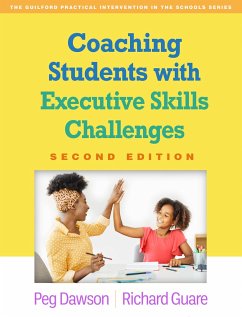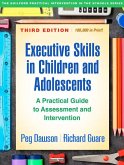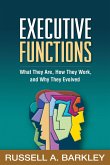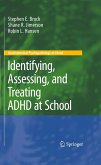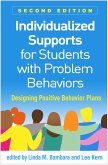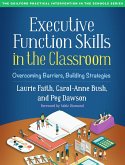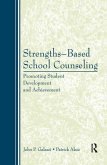- Gebundenes Buch
- Merkliste
- Auf die Merkliste
- Bewerten Bewerten
- Teilen
- Produkt teilen
- Produkterinnerung
- Produkterinnerung
With 55% new material, the significantly revised second edition of this influential resource presents a refined coaching model and an expanded set of tools for helping kids and teens live up to their potential in school and beyond.
Andere Kunden interessierten sich auch für
![Executive Skills in Children and Adolescents Executive Skills in Children and Adolescents]() Peg DawsonExecutive Skills in Children and Adolescents77,99 €
Peg DawsonExecutive Skills in Children and Adolescents77,99 €![Executive Functions Executive Functions]() Russell A BarkleyExecutive Functions56,99 €
Russell A BarkleyExecutive Functions56,99 €![Identifying, Assessing, and Treating ADHD at School Identifying, Assessing, and Treating ADHD at School]() Stephen E. BrockIdentifying, Assessing, and Treating ADHD at School114,99 €
Stephen E. BrockIdentifying, Assessing, and Treating ADHD at School114,99 €![Individualized Supports for Students with Problem Behaviors Individualized Supports for Students with Problem Behaviors]() Individualized Supports for Students with Problem Behaviors92,99 €
Individualized Supports for Students with Problem Behaviors92,99 €![Executive Function Skills in the Classroom Executive Function Skills in the Classroom]() Laurie FaithExecutive Function Skills in the Classroom60,99 €
Laurie FaithExecutive Function Skills in the Classroom60,99 €![Strengths-Based School Counseling Strengths-Based School Counseling]() John P GalassiStrengths-Based School Counseling187,99 €
John P GalassiStrengths-Based School Counseling187,99 €![Thriving in College with ADHD Thriving in College with ADHD]() Will CanuThriving in College with ADHD166,99 €
Will CanuThriving in College with ADHD166,99 €-
-
-
With 55% new material, the significantly revised second edition of this influential resource presents a refined coaching model and an expanded set of tools for helping kids and teens live up to their potential in school and beyond.
Hinweis: Dieser Artikel kann nur an eine deutsche Lieferadresse ausgeliefert werden.
Hinweis: Dieser Artikel kann nur an eine deutsche Lieferadresse ausgeliefert werden.
Produktdetails
- Produktdetails
- Verlag: Guilford Publications
- 2nd edition
- Seitenzahl: 226
- Erscheinungstermin: 24. Mai 2023
- Englisch
- Abmessung: 267mm x 203mm x 14mm
- Gewicht: 762g
- ISBN-13: 9781462552207
- ISBN-10: 146255220X
- Artikelnr.: 67130001
- Herstellerkennzeichnung
- Libri GmbH
- Europaallee 1
- 36244 Bad Hersfeld
- gpsr@libri.de
- Verlag: Guilford Publications
- 2nd edition
- Seitenzahl: 226
- Erscheinungstermin: 24. Mai 2023
- Englisch
- Abmessung: 267mm x 203mm x 14mm
- Gewicht: 762g
- ISBN-13: 9781462552207
- ISBN-10: 146255220X
- Artikelnr.: 67130001
- Herstellerkennzeichnung
- Libri GmbH
- Europaallee 1
- 36244 Bad Hersfeld
- gpsr@libri.de
Peg Dawson, EdD, is a psychologist who provides professional development training on executive skills for schools and organizations nationally and internationally. She was previously on the staff of the Center for Learning and Attention Disorders at Seacoast Mental Health Center in Portsmouth, New Hampshire. Dr. Dawson is a past president of the New Hampshire Association of School Psychologists, the National Association of School Psychologists (NASP), and the International School Psychology Association, and a recipient of the Lifetime Achievement Award from NASP. She is coauthor of bestselling books for general readers, including Smart but Scattered, Smart but Scattered Teens, Smart but Scattered--and Stalled (with a focus on emerging adults), and The Smart but Scattered Guide to Success (with a focus on adults). Dr. Dawson is also coauthor of The Work-Smart Academic Planner, Revised Edition, and books for professionals including Executive Skills in Children and Adolescents, Third Edition. Richard Guare, PhD, BCBA-D, is a neuropsychologist and board-certified behavior analyst who frequently consults to schools and agencies on attention and executive skills difficulties. He is former Director of the Center for Learning and Attention Disorders at Seacoast Mental Health Center in Portsmouth, New Hampshire. Dr. Guare is coauthor of bestselling books for general readers, including Smart but Scattered, Smart but Scattered Teens, Smart but Scattered--and Stalled (with a focus on emerging adults), and The Smart but Scattered Guide to Success (with a focus on adults). He is also coauthor of The Work-Smart Academic Planner, Revised Edition, and books for professionals including Executive Skills in Children and Adolescents, Third Edition.
I. Theoretical and Research Background
1. The Development of Executive Skills in the Brain: Biology and Experience
2. Theoretical Underpinnings for Coaching
II. Our Coaching Model
3. Introduction
4. Coaching Secondary Students
5. Coaching Elementary Students
6. Case Examples
III. Coaching Techniques
7. Motivational Interviewing
8. Communication Techniques for Elementary Coaches
9. Self-Assessment as a Tool for Honing Coaching Skills
10. Goal Setting and Action Planning
11. Progress Monitoring
IV. Strategies and Special Applications
12. Strategies to Support Executive Skills Coaching
13. Adaptations for Coaching Students with Disabilities
14. Other Forms of Coaching
15. Parting Thoughts
Appendix 1. Getting to Know You Survey
Appendix 2. Executive Skills Questionnaire
Appendix 3. Executive Skills Questionnaire--Adult Version
Appendix 4. Executive Skills Problem Checklist
Appendix 5. Executive Skills Semistructured Interview--Student Version
Appendix 6. Parent Handout
Appendix 7. Consent for Services: Executive Functioning Coaching
Appendix 8. Model of an Independent Coaching Contract
Appendix 9. Goal-Planning Template
Appendix 10. Daily Coaching Form
Appendix 11. Coach Feedback Form--Student Version
Appendix 12. Coach Feedback Form--Coach Version
Appendix 13. Executive Skills Questionnaire for
Children--Preschool/Kindergarten Version
Appendix 14. Executive Skills Questionnaire for Children--Lower Elementary
Version
Appendix 15. Executive Skills Questionnaire for Children/Adolescents
Appendix 16. Executive Skills Problem Checklist--Elementary Version for
Teachers
Appendix 17. Executive Skills Problem Checklist--Elementary Version for
Parents
Appendix 18. Basic Self-Assessment
Appendix 19. Advanced Self-Assessment Score Sheet
Appendix 20. Motivational Interviewing Resources
Appendix 21. Environmental Modifications Menu
Appendix 22. Example of Elaborate Incentive System
Appendix 23. Strategies for Specific Executive Skills
Appendix 24. How to Write an Essay
Appendix 25. How to Plan and Complete Long-Term Projects
Appendix 26. Studying for Tests
Appendix 27. How to Organize Notebooks/Homework
Appendix 28. How to Take Notes
Appendix 29. Learning to Solve Problems
References
Index
1. The Development of Executive Skills in the Brain: Biology and Experience
2. Theoretical Underpinnings for Coaching
II. Our Coaching Model
3. Introduction
4. Coaching Secondary Students
5. Coaching Elementary Students
6. Case Examples
III. Coaching Techniques
7. Motivational Interviewing
8. Communication Techniques for Elementary Coaches
9. Self-Assessment as a Tool for Honing Coaching Skills
10. Goal Setting and Action Planning
11. Progress Monitoring
IV. Strategies and Special Applications
12. Strategies to Support Executive Skills Coaching
13. Adaptations for Coaching Students with Disabilities
14. Other Forms of Coaching
15. Parting Thoughts
Appendix 1. Getting to Know You Survey
Appendix 2. Executive Skills Questionnaire
Appendix 3. Executive Skills Questionnaire--Adult Version
Appendix 4. Executive Skills Problem Checklist
Appendix 5. Executive Skills Semistructured Interview--Student Version
Appendix 6. Parent Handout
Appendix 7. Consent for Services: Executive Functioning Coaching
Appendix 8. Model of an Independent Coaching Contract
Appendix 9. Goal-Planning Template
Appendix 10. Daily Coaching Form
Appendix 11. Coach Feedback Form--Student Version
Appendix 12. Coach Feedback Form--Coach Version
Appendix 13. Executive Skills Questionnaire for
Children--Preschool/Kindergarten Version
Appendix 14. Executive Skills Questionnaire for Children--Lower Elementary
Version
Appendix 15. Executive Skills Questionnaire for Children/Adolescents
Appendix 16. Executive Skills Problem Checklist--Elementary Version for
Teachers
Appendix 17. Executive Skills Problem Checklist--Elementary Version for
Parents
Appendix 18. Basic Self-Assessment
Appendix 19. Advanced Self-Assessment Score Sheet
Appendix 20. Motivational Interviewing Resources
Appendix 21. Environmental Modifications Menu
Appendix 22. Example of Elaborate Incentive System
Appendix 23. Strategies for Specific Executive Skills
Appendix 24. How to Write an Essay
Appendix 25. How to Plan and Complete Long-Term Projects
Appendix 26. Studying for Tests
Appendix 27. How to Organize Notebooks/Homework
Appendix 28. How to Take Notes
Appendix 29. Learning to Solve Problems
References
Index
I. Theoretical and Research Background
1. The Development of Executive Skills in the Brain: Biology and Experience
2. Theoretical Underpinnings for Coaching
II. Our Coaching Model
3. Introduction
4. Coaching Secondary Students
5. Coaching Elementary Students
6. Case Examples
III. Coaching Techniques
7. Motivational Interviewing
8. Communication Techniques for Elementary Coaches
9. Self-Assessment as a Tool for Honing Coaching Skills
10. Goal Setting and Action Planning
11. Progress Monitoring
IV. Strategies and Special Applications
12. Strategies to Support Executive Skills Coaching
13. Adaptations for Coaching Students with Disabilities
14. Other Forms of Coaching
15. Parting Thoughts
Appendix 1. Getting to Know You Survey
Appendix 2. Executive Skills Questionnaire
Appendix 3. Executive Skills Questionnaire--Adult Version
Appendix 4. Executive Skills Problem Checklist
Appendix 5. Executive Skills Semistructured Interview--Student Version
Appendix 6. Parent Handout
Appendix 7. Consent for Services: Executive Functioning Coaching
Appendix 8. Model of an Independent Coaching Contract
Appendix 9. Goal-Planning Template
Appendix 10. Daily Coaching Form
Appendix 11. Coach Feedback Form--Student Version
Appendix 12. Coach Feedback Form--Coach Version
Appendix 13. Executive Skills Questionnaire for
Children--Preschool/Kindergarten Version
Appendix 14. Executive Skills Questionnaire for Children--Lower Elementary
Version
Appendix 15. Executive Skills Questionnaire for Children/Adolescents
Appendix 16. Executive Skills Problem Checklist--Elementary Version for
Teachers
Appendix 17. Executive Skills Problem Checklist--Elementary Version for
Parents
Appendix 18. Basic Self-Assessment
Appendix 19. Advanced Self-Assessment Score Sheet
Appendix 20. Motivational Interviewing Resources
Appendix 21. Environmental Modifications Menu
Appendix 22. Example of Elaborate Incentive System
Appendix 23. Strategies for Specific Executive Skills
Appendix 24. How to Write an Essay
Appendix 25. How to Plan and Complete Long-Term Projects
Appendix 26. Studying for Tests
Appendix 27. How to Organize Notebooks/Homework
Appendix 28. How to Take Notes
Appendix 29. Learning to Solve Problems
References
Index
1. The Development of Executive Skills in the Brain: Biology and Experience
2. Theoretical Underpinnings for Coaching
II. Our Coaching Model
3. Introduction
4. Coaching Secondary Students
5. Coaching Elementary Students
6. Case Examples
III. Coaching Techniques
7. Motivational Interviewing
8. Communication Techniques for Elementary Coaches
9. Self-Assessment as a Tool for Honing Coaching Skills
10. Goal Setting and Action Planning
11. Progress Monitoring
IV. Strategies and Special Applications
12. Strategies to Support Executive Skills Coaching
13. Adaptations for Coaching Students with Disabilities
14. Other Forms of Coaching
15. Parting Thoughts
Appendix 1. Getting to Know You Survey
Appendix 2. Executive Skills Questionnaire
Appendix 3. Executive Skills Questionnaire--Adult Version
Appendix 4. Executive Skills Problem Checklist
Appendix 5. Executive Skills Semistructured Interview--Student Version
Appendix 6. Parent Handout
Appendix 7. Consent for Services: Executive Functioning Coaching
Appendix 8. Model of an Independent Coaching Contract
Appendix 9. Goal-Planning Template
Appendix 10. Daily Coaching Form
Appendix 11. Coach Feedback Form--Student Version
Appendix 12. Coach Feedback Form--Coach Version
Appendix 13. Executive Skills Questionnaire for
Children--Preschool/Kindergarten Version
Appendix 14. Executive Skills Questionnaire for Children--Lower Elementary
Version
Appendix 15. Executive Skills Questionnaire for Children/Adolescents
Appendix 16. Executive Skills Problem Checklist--Elementary Version for
Teachers
Appendix 17. Executive Skills Problem Checklist--Elementary Version for
Parents
Appendix 18. Basic Self-Assessment
Appendix 19. Advanced Self-Assessment Score Sheet
Appendix 20. Motivational Interviewing Resources
Appendix 21. Environmental Modifications Menu
Appendix 22. Example of Elaborate Incentive System
Appendix 23. Strategies for Specific Executive Skills
Appendix 24. How to Write an Essay
Appendix 25. How to Plan and Complete Long-Term Projects
Appendix 26. Studying for Tests
Appendix 27. How to Organize Notebooks/Homework
Appendix 28. How to Take Notes
Appendix 29. Learning to Solve Problems
References
Index

